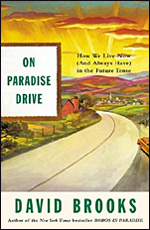Something's going on here, and we haven't quite gotten hold of its far-reaching consequences. In 1950 only 23 percent of Americans lived in suburbia, but now most do, and today's suburbs keep expanding out into exurban orbs. The city of Atlanta added 23,000 people over the past decade but its surrounding suburbs grew by 1.1 million. In the 1990s, 90 percent of all office space was built in suburbia as many companies relocated into far-flung office parks along the interstates. There is more office space in those spaces than in any metropolitan area except Chicago and New York. And here's a real eye-opener: "We have a huge mass of people who not only don't live in cities, they don't commute to cities, go to movies in the cities, eat in the cities, or have any significant contact with urban life. They are neither rural, nor urban, nor residents of a bedroom community. They are charting a new way of living."
So writes David Brooks, a political journalist and "comic sociologist" who writes a weekly Op-Ed column for The New York Times and is the author of Bobos in Paradise, a very clever portrait of the 1960s generation and their change of character in pursuit of prosperity and in the face of aging.
Like its predecessor, On Paradise Drive is always entertaining and very insightful. Brooks wonders what kind of people are inhabiting the suburban sprawl. Why are they in such a rush, caught up in a frenzied way of working and trying so desperately to train their kids to be super-achievers? He wants to find out whether American idealism and hope have made these suburbanites into something more than selfish materialists.
Touring the varied regions of suburbia, Brooks looks at the cool ones who choose to live in cities; the crunchy ones who inhabit starter suburbs and see themselves as the bohemian supporters of anti-commercialism; the upscale professionals who live in zones where master-bedroom spas are the norm; the immigrants living in enclaves of people from the same country while they try to find a better perch for themselves in the larger society; the suburban core who are comfortable with conformity, country clubs, and backyard barbecues; and the exurb residents who drive oversized vehicles on highways "so clean and freshly paved you can eat off them." Out in the suburban supernova, as Brooks calls it, nobody knows who is mainstream and who is alternative, who is conservative and who is liberal, who is elite and who is populist. Brooks tries to delve deeper by providing snapshots of the values of these diverse folk as they work, raise their children, worship, shop, and move around.
Although Brooks is often very funny, he can be deadly serious. He snarls at social scientists and storytellers who over the past decade have released a torrent of books attacking suburbia as boring, artificial, morally bankrupt, and materialistic to the point of excess. "The United States is the Cosmic Blonde of nations," he notes. "People around the world concede that American culture has a certain appeal. . . . When many foreign observers look at America they see the culture of Coca Cola, McDonald's, Disney, boob jobs, Bart Simpson, and boy bands. They see a country that invented Prozac and Viagra, paper party hats, pinball machines, commercial jingles, expensive orthodontia, and competitive cheerleading." But if you look at recent American novels and cultural criticism, you see that anxiety about success has produced a "Chorus of Bemoaning" that describes suburbia as "a comfortable but somewhat vacuous realm of unreality: consumerist, wasteful, complacent, materialistic, and self-absorbed."
Brooks doesn't think that's the whole picture. He'd rather emphasize the unbridled energy and idealism of America. He quotes Thomas Wolfe in You Can't Go Home Again: "It is also true, and this is the curious paradox about America — that these same men who stand upon the corner and wait around on Sunday afternoons for nothing are filled at the same time with an almost quenchless hope, an almost boundless optimism, an almost indestructible belief that something is bound to turn up, something is sure to happen."
Brooks believes that the millions of people in the uncharted territories of suburban sprawl are characterized by their optimistic faith in the future: "Born in abundance, inspired by opportunity, nurtured in imagination, spiritualized by a sense of God's blessing and call, and realized in ordinary life day by day, this Paradise Spell is the controlling ideology of American life." It is this energy that animates citizens to work so hard, to push their children, to move frequently, to consume with abandon, and to change religions so often.
But sadly, this bright future is not open to all members of American society. Although the migrant worker and the fast food employee and the woman just released from prison have dreams of achievement dancing in their heads, the obstacles to reaching their goals are more daunting than ever before. The society is set up so that the winning class gets preferential treatment from lawmakers and businesses. "Everybody can be an aristocrat within his own Olympus," Brooks argues. Try telling that to the millions of American families living at or below the poverty line. For them, the Paradise Spell is just a clever concept in the minds of those who have it all and don't want to share it with anybody else.
